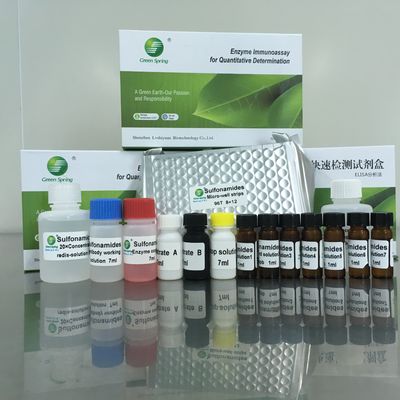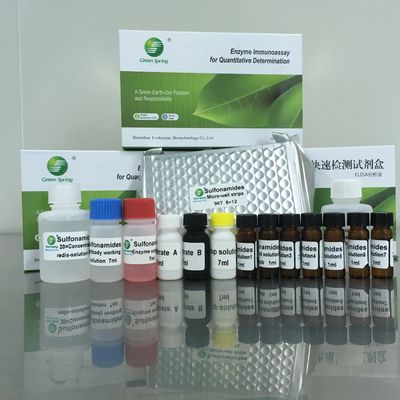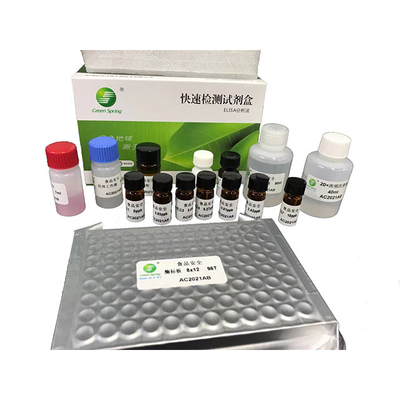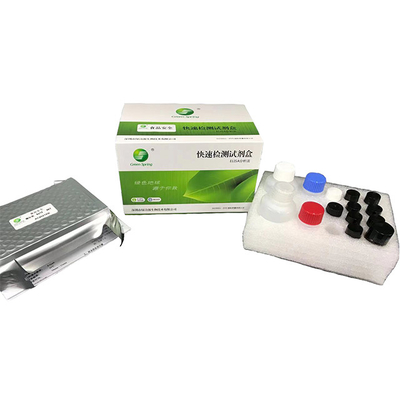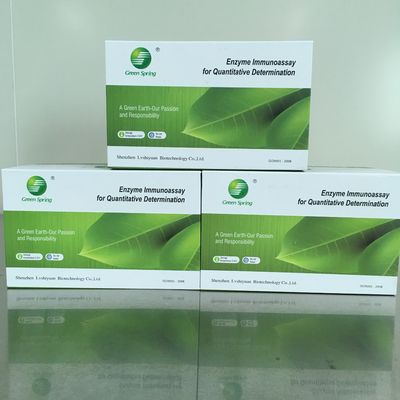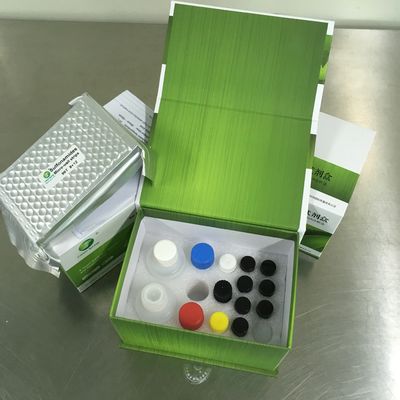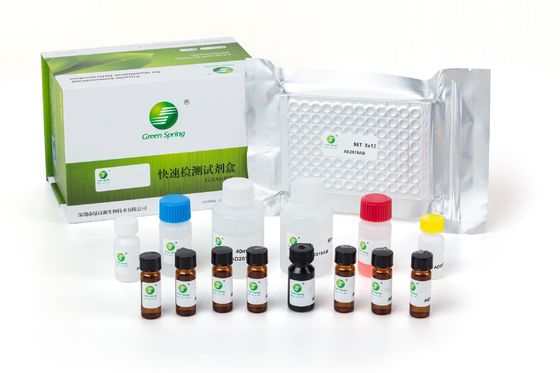|
|
LSY-10018 Ampicillin ELISA assay Food Safety diagnostic kit antibiotic
Product Details:
Payment & Shipping Terms:
|
| Specifications: | 96 Wells/kit | Sensitivity: | 0.5ppb |
|---|---|---|---|
| Incubation Temperature: | 25℃ | Incubation Time: | 30min—10~15min |
| Detection Limit: | Tissue, Egg, Pure Milk About 1ppb | Recovery Rate: | 90%±30% |
| Highlight: | elisa test kit,Ampicillin elisa detection,veterinary drug residue assay kit |
||
Ampicillin ELISA Test Kit
Catalog No. LSY-10018
1. Principle
This test kit is based on the competitive enzyme immunoassay for the detection of Ampicillin in the sample. The coupling antigens are pre-coated on the micro-well stripes. The Ampicillin in the sample and the coupling antigens pre-coated on the micro-well stripes compete for the anti- Ampicillin antibody. After the addition of the enzyme conjugate, the TMB substrate is added for coloration. The optical density (OD) value of the sample has a negative correlation with the Ampicillin in it. This value is compared to the standard curve and the Ampicillin concentration is subsequently obtained.
2. Technical specifications
Sensitivity: 0.5 ppb
Standard curve range: 0.05ppb-4.05ppb;
Intra-plate variation coefficient:<5%;
Variation coefficient between plates:<15%;
The best value of B0 absorbance:>0.8;
Incubation Temperature: 25℃
Incubation Time: 30min—10~15min
Detection limit:
Tissue, egg, pure milk............................................................... about 1ppb
Note: ppb=ng/mL or ng/g
Cross-reaction rate
Ampicillin......................................................................................... 100%
Recovery rate:
90%±30%
3. Components
- Micro-well strips: 12 strips with 8 removable wells each
- Standard solution (1ml/bottle): 0ppb, 0.05ppb, 0.15ppb, 0.45ppb, 1.35ppb, 4.05ppb.
- 11X Concentrated Enzyme conjugate (0.7 mL)
- Enzyme conjugate dilution (7 mL)
- 20× concentrated washing buffer (30 mL)
- Sample diluent solution (20 mL)
- Substrate A (7 mL)
- Substrate B (7 mL)
- Stop solution (7 mL)
4. Materials required but not provided
- Equipments: microplate reader (450nm, 630nm), rotary evaporator/nitrogen-drying device, homogenizer, oscillator, centrifuge (4000g and above), balance (a sensibility reciprocal of 0.01 g), measuring pipets, incubator (adjustable 25℃),timer
- Micropipettors: single-channel 20~200 µL and 100~1000 µL, and eight-channel 30~300 µL;
- Reagents: Deionized water, Concentrated hydrochloric acid (analytical reagent).
5. Sample pre-treatment
Instructions
The following points must be dealt with before the pre-treatment of any kind of sample:
1) Only the disposable tips can be used for the experiments and the tips must be changed when used for absorbing different reagents;
2) Before the experiment, each experimental equipment must be clean and should be re-cleaned if necessary, in order to avoid the contamination that interferes with the experimental results.
Solution preparation before sample pre-treatment:
- Washing buffer: 1 part 20× concentrated washing buffer + 19 parts deionized water;
- 1M HCl: take 8.6 mL Concentrated hydrochloric acid, add deionized water to 100 mL;
5.1 Tissue
1) Take 1.0±0.05g tissue sample into a 10ml polystyrene centrifuge tube, add 4ml deionized water, vortex for 1min,centrifuge at 3000g at room temperature (20 - 25 ℃) for 5min;
2) Take 200ul up-layer clear liquid into a 2ml polystyrene centrifuge tube, add 200ul of the Sample diluent solution, vortex for 10s;
3) Take 50 µL liquid for analysis.
Fold of dilution of the sample: 10
5.2 Egg
1) Take 1.0±0.05g homogenized egg sample into a 10ml polystyrene centrifuge tube, add 4ml deionized water, then add 150uL 1M HCl ,vortex for 1min,centrifuge at 3000g at room temperature (20 - 25 ℃) for 5min;
2) Take 200ul up-layer clear liquid into a 2ml polystyrene centrifuge tube, add 200ul of the Sample diluent solution, vortex for 10s;
3) Take 50ul for analysis.
Fold of dilution of the sample: 10
5.3 Pure milk
1) Take 1.0mL pure milk sample into a 10ml polystyrene centrifuge tube, add 4ml deionized water, then add 40uL 1M HCl ,vortex for 1min,centrifuge at 3000g at room temperature (20 - 25 ℃) for 5min;
2) Take 200ul up-layer clear liquid into a 2ml polystyrene centrifuge tube, add 200ul of the Sample diluent solution, vortex for 10s;
3) Take 50ul for analysis.
Fold of dilution of the sample: 10
6. ELISA procedures
Instructions
1. Bring all reagents and micro-well strips to the room temperature (20-25 ℃).
2. Return all reagents to 2-8 ℃ immediately after use.
3 .The reproducibility of the ELISA analysis, to a large degree, depends on the consistency of plate washing. The correct operation of plate washing is the key point in the procedures of ELISA.
4. For the incubation at constant temperatures, all the samples and reagents must avoid light exposure, and each microplate should be sealed by the cover membrane.
Operation procedures
- Take out all the necessary reagents from the kit and place at the room temperature (20 to 25 ℃) for at least 30 minutes. Note that each liquid reagent must be shaken to mix evenly before use.
- Take the required micro-well strips and plate frames. Re-sealed the unused microplate, stored at 2-8 ℃, not frozen.
- Numbering: number the micro-wells according to samples and standard solution; each sample and standard solution should be performed in duplicate; record their positions.
- Add 50µL of the sample or standard solution to separate duplicate wells;
- Enzyme conjugate preparation: take 1 part 11X Concentrated Enzyme conjugate, add 10 parts Enzyme conjugate dilution, dilute at 1:10 (Note: Please be sure to mix and use as immediately needed!).
- Add Enzyme conjugate, 50 µL each well. Mix gently by shaking the plate manually, seal the microplate with the cover membrane, and incubate at 25 ℃ at dark for 30 minutes.
- Pour liquid out of microwell, add 250 µL/well of washing buffer for 15-30 seconds, repeat three to four times, then flap to dry (if there are the bubbles after flapping, cut them with the clean tips).
- Coloration: add 100 µL mixture of the substrate A and substrate B into each well (Note: mix Substrate A and Substrate B at 1:1, the mixture should be used in 10min, never use metal container or metal to stir the solution, otherwise the substrate may be invalid.). Mix gently by shaking the plate manually, and incubate at 25 ℃ for 10-~15 minutes at dark for coloration.
- Determination: add 50 µL of the stop solution into each well (The substrate color from blue to yellow, it means the stop succeeds). Mix gently by shaking the plate manually. Set the wavelength of the microplate reader at 450 nm to determine the OD value (Recommend to read the OD value at the dual-wavelength 450/630 nm within 5 minutes).
7. Result judgment
Quantitative determination
The mean values of the absorbance values is equivalent to the percentage of the average OD value (B) of the sample and the standard solution divided by the OD value (B0) of the first standard solution (0 standard) and subsequently multiplied by 100%, that is,
| Percentage of absorbance value = | B | ×100% |
| B0 |
B—the average (double wells) OD value of the sample or the standard solution
B0—the average OD value of the 0 ng/mL standard solution
Draw the standard curve with the absorption percentages of the standard solutions and the semilogarithm values of the Ampicillin standard solutions (ng/mL) as Y- and X-axis, respectively. Read the corresponding concentration of the sample from the standard curve by incorporating its absorption percentage into the standard curve. The resulting value is subsequently multiplied by the corresponding dilution fold, thus finally obtaining Ampicillin concentration in the sample.
8. Precautions
- The room temperature below 25 ℃ or the temperature of the reagents and the samples being not returned to the room temperature (20-25 ℃) will lead to a lower standard OD value.
- Dryness of the microplate in the washing process will be accompanied by the situations including the non-linear standard curves and the undesirable reproducibility.
- Mix every reagent and reaction mixture evenly and wash the microplate thoroughly, otherwise there will be the undesirable reproducibility.
- The stop solution is the 2 M sulfuric acid solution, avoid contacting with the skin.
- Put the unused microplate into an auto-sealing bag to re-seal it. The standard substance and the colourless color former is light sensitive, and thus they cannot be directly exposed to the light.
- Do not use the kit exceeding its expiry date. The use of diluted or adulterated reagents from the kits will lead to the changes in the sensitivity and the detecting OD values. Do not exchange the reagents from the kits of different lot numbers to use.
- Discard the colouration solution with any color that indicates the degeneration of this solution. The detecting value of the 0 standard solution of less than 0.5 indicates its degeneration.
- The optimum reaction temperature is 25 ℃, and too high or too low temperatures will result in the changes in the detecting sensitivity and OD values.
9. Storage and expiry date
Storage: store at 2-8 ℃, not frozen.
Expiry date: 12 months; date of production is on the box.
Shenzhen Lvshiyuan Biotechnology Co., Ltd
D Building, National Biological Industrial Park of Marinelife, No.2 Binhai Road, Dapeng, Shenzhen, 518120 China
Tel. 86-755-28438788
Fax 86-755-28938800
Email: info@lsybt.com
www.lsybt.com
![]()
![]()
-
LSY-10049 Chlortetracyline ELISA test kit Antibiotic detection
-
LSY-10050 Erythromycin ELISA test kit for milk, honey, tissue
-
LSY-10046 MQCA Olaquindox metabolites ELISA Test Kit ISO certificated
-
LSY-10047 Nitroimidazoles ELISA Test Kit for tissue, honey, milk and egg
-
LSY-10047 Nitromidazoly ELISA Test Kit antibiotic residue Food safety
-
LSY-10047 Nitromidazoly ELISA Test Kit Food testing ISO certificated



